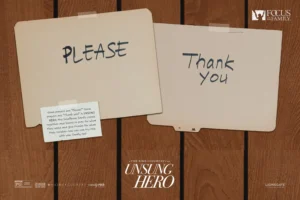
The Secret of Gratitude
The work of Christ in our lives is just plain bigger than our circumstances

What is a worldview and how does it impact how we view our family and our consumption of entertainment? Discover how you can find meaning through building a strong foundation and worldview upon the Christian faith.
Estimated reading time: 6 minutes
At Plugged In, we think a lot about entertainment. From movies to music, TV to YouTube, books to video games, we strive to give you concrete and accurate information to help you decide what’s right for your family.
But we also want to help you and your family go deeper when it comes to parsing the messages, ideas and values that may not be as easy to identify as really problematic content. How do we recognize and help our kids learn to navigate through perspectives that veer from the beliefs we cherish as followers of Christ?
We want to hit those kinds of topics head on in this new Plugged In Parenting section. And we’ll start today with the concept of worldview.
You’ve likely heard the word worldview at some point. But let’s start with this simple definition. A worldview is a way of looking at the world that helps you make sense of it. Everyone has one, because we’re all trying. Whether we realize it or not. We all want to understand how to make our way meaningfully in the world.
Think of it like a pair of glasses that you wear: those lenses shape and refract the world’s ideas and values as they come at you. They filter not what you see, but how you see it. And that allows you to figure out what to do with the information you gather.
A worldview is like that set of glasses, the lenses of which are made up of our ideas, beliefs and feelings and experiences. This concept is often described today using the word narrative, which also gets at the fact that our perspective on life is, in many ways, story-like.
My own set of “glasses” is influenced by all kinds of experiences, from growing up in a small town in Iowa amid two farming families, to the schools I went to, the different church traditions I’ve embraced, and any number of prodigally rebellious moments along the way.
Then, let’s toss in my favorite songs, movies, TV shows, websites, all of which have, perhaps in big ways or smaller, helped to form my perspective on reality. I remember singing Whitesnake’s 1987 hit “Here I Go Again” over and over as a teen who saw himself as “a drifter who was born to walk alone.” That line, ingested enough times by an isolated and oft-rejected boy, was more powerful than you might believe, unconsciously reinforcing my teen self-perception that I was a misunderstood loner.
That story represents worldview-shaping in my own life. But I can only see it now. Looking back, as there wasn’t anyone walking closely enough with me to help me recognize some of the untruths that I identified with and embraced in a seemingly simple song. It warped my worldview.
OK, let’s go a bit deeper. What does a worldview do? Well, it poses—and answers—some significant questions. A worldview addresses big-picture wonderings about origins and endings—as well as the messy middle in between. How did we get here? Where are we going? What does it look like to live a meaningful life in between those two bookends?
A worldview thus answers a whole bunch of key questions:
As I said, everyone has a worldview. And when we come to know Jesus Christ, He begins to reshape our hearts, minds, and souls. But that reshaping isn’t instantaneous. We are justified by faith in him in a moment. But the process of sanctification—of growing to be more like Him—takes a lifetime.
As we view reality through the prism of our Christian faith, our point of view is reconstructed and transformed. It becomes more coherent and integrated because we have a unifying frame of reference. And as we mature in the faith, that deepening Christian worldview enables us to think clearly about competing worldviews that are everywhere in popular culture.
We know from social scientists that kids are growing up spending many, many hours a day on screens, engaging with entertainment, and social media. Some studies say that screentime may be approaching nine hours a day (or more!) for 21st-century kids (and about the same amount for us as parents, lest you think you’re off the hook).
Given that sobering reality, the need for understanding how media and entertainment shape our kids’ hearts, souls, and passions has never, I’d argue, been greater.
We no longer live in a culture with a shared understanding of what is real, true, or good. All those things are up for grabs. Our reality reflects a vast sea of entertainment that our kids swim through every day.
As parents, we have a responsibility not only to protect our children from these influences when they’re younger, but also to equip them to be able to face this onslaught of ideas on their own as they grow into young adults. To do that, we must be actively, intentionally engaged in conversations about our popular culture.
A handful of simple worldview questions can foster that kind of conversation. They can help our children begin to grow in wisdom, discernment, and understanding. These starter questions can apply to anything in popular culture, from a TV show to music, a movie to a video game, an advertisement to a bumper sticker:
That last question, especially, has been great in launching conversations with my children. It also models critical thinking and teaches them that we don’t have to be afraid of ideas or beliefs that differ from our own.
As our kids get used to these kinds of conversations, and as they mature and become able to engage in more sophisticated discussions, our worldview questions naturally get deeper too.
It’s easy to look at the realm of popular culture and conclude that the only proper response to is to avoid it completely. But avoidance can’t be our only strategy as parents. Especially as our kids begin thinking about their world more deeply in their teen years.
When we employ this kind of conversational process with popular culture’s worldviews, we model intentional, critical engagement with it for our children. We don’t have to be afraid of the world, but we do need to engage with it wisely and thoughtfully.
Like Paul on Mars Hill in Athens in Acts 17, we have the ability to observe what’s happening in the culture, to critique it, and to use those things as a bridge back to the truth of the gospel.